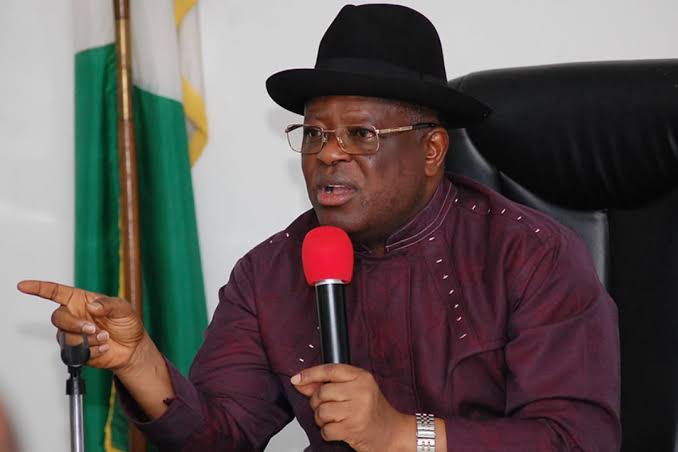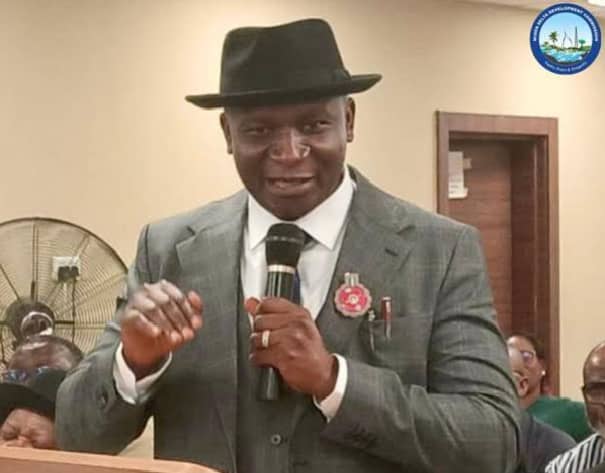The Federal Government has officially terminated the contract for the reconstruction of Section 1 (Benin-Imasabor) of the Benin-Sapele-Warri Road.
The project, initially awarded to Levant Construction Ltd under the Road Infrastructure Development and Refurbishment Investment Tax Credit Scheme, was canceled due to the company’s failure to meet its contractual obligations.
Minister of Works David Umahi announced the cancellation during a press briefing held after a meeting with executives from GELD Construction Ltd and SKECC Nigeria Ltd. The meeting focused on addressing delays in the Benin-Sapele-Warri road project and took place in his Abuja office.
Also present at the meeting were the Minister of State for Works, Hon. Bello Goronyo, the Permanent Secretary of the Ministry, Engr. Olufunso Adebiyi, and senior officials from key departments within the Ministry of Works.
The announcement was accompanied by an official statement released by Umahi’s Special Adviser on Media, Orji Uchenna Orji. According to the statement, Levant Construction failed to respond to multiple warnings and a final termination notice, prompting the ministry to take decisive action.
Minister Umahi expressed disappointment in Levant’s handling of the project, particularly the company’s withdrawal from the construction site despite repeated calls to return. He revealed that the project was segmented into three parts, with Levant assigned one section. However, due to the poor condition of the route and Levant’s inaction, the Edo State Government was requested to intervene.
Umahi said the federal government had urged Levant to focus on one portion of the road, while the Edo State Government addressed another section totaling approximately 23 kilometers. The project under the state’s management is progressing well, while Levant abandoned its designated portion.
The Minister explained that after issuing a termination notice, contractors are given 14 days to return to the site and resume work. In this case, Levant did not respond within the required timeframe. As a result, Umahi directed the Permanent Secretary to ensure formal termination procedures are completed, including a joint measurement to determine the work done so far.
He also instructed that Levant’s bank be contacted to begin the process of recovering the Advance Payment Guarantee (APG). Should the company fail to comply with refund requirements, the Minister warned that the case could be referred to the Economic and Financial Crimes Commission (EFCC) for further investigation and enforcement.
While addressing the issue of Levant’s contract termination, Umahi expressed optimism about the commitments made by other contractors involved in the road project. He commended GELD Construction Ltd and SKECC Nigeria Ltd for their renewed pledges to accelerate progress on their respective segments of the road.
The Minister also praised state-level support, notably from the Governors of Edo and Delta States. He credited both governors for their proactive roles in supplementing the federal road efforts.
Speaking on the Delta State Government’s contributions, Umahi highlighted the construction of three simultaneous flyovers under the leadership of Governor Sheriff Oborevwori. He described the structures as exemplary and said they serve as a model for future infrastructure projects across Nigeria.
Umahi revealed that the federal government had requested Governor Oborevwori to extend his state’s support by constructing an additional 10 kilometers of reinforced concrete road. The Governor reportedly agreed to this request, earning further praise from the Minister.
Similarly, Umahi acknowledged the role of Edo State Governor, Senator Monday Okpebholo, whose administration has also taken responsibility for a portion of the Benin-Sapele-Warri road.
The termination of the ₦35 billion contract with Levant Construction marks a significant step by the Federal Ministry of Works in its ongoing effort to ensure accountability and timely delivery of national infrastructure projects. The ministry has reiterated its commitment to working with responsible contractors and partnering with willing state governments to address Nigeria’s critical road infrastructure needs.





